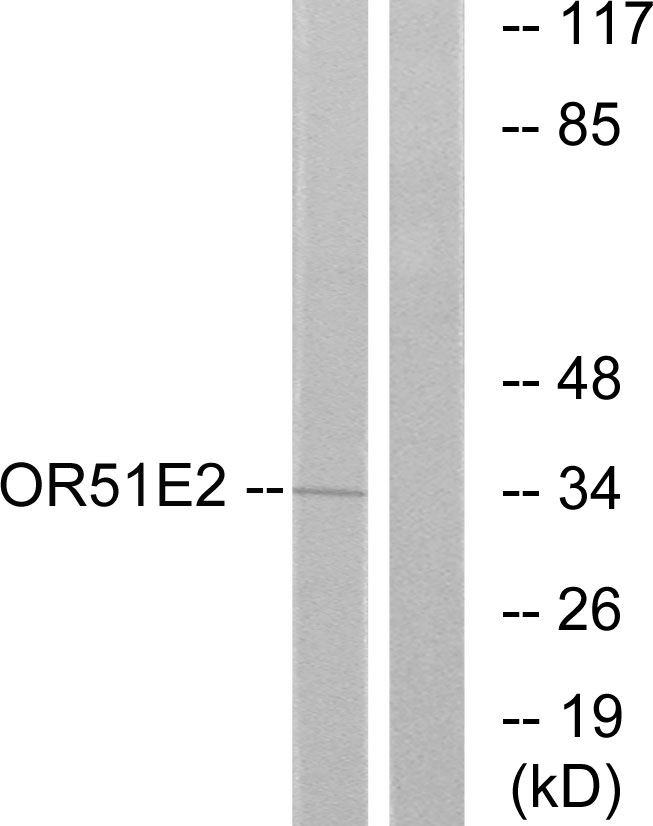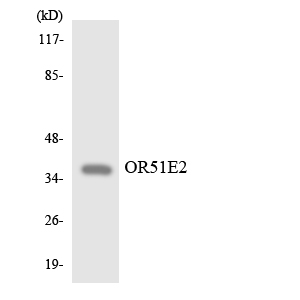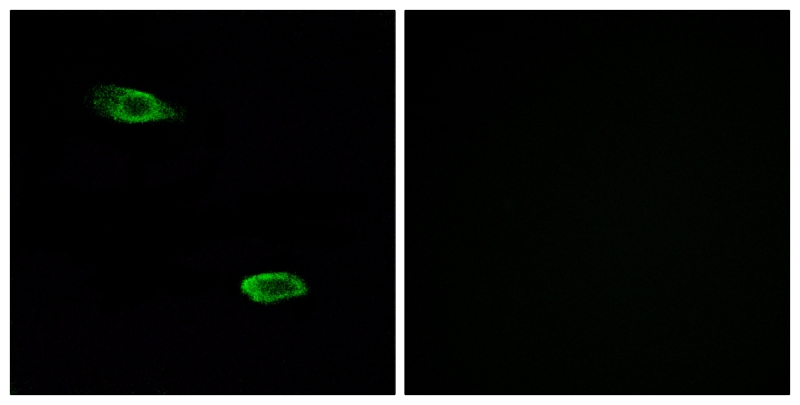


| WB | 咨询技术 | Human,Mouse,Rat |
| IF | 咨询技术 | Human,Mouse,Rat |
| IHC | 咨询技术 | Human,Mouse,Rat |
| ICC | 1/50-1/200 | Human,Mouse,Rat |
| FCM | 咨询技术 | Human,Mouse,Rat |
| Elisa | 1/10000 | Human,Mouse,Rat |
| Aliases | PSGR; HPRAJ; OR52A2; OR51E3P |
| Entrez GeneID | 81285 |
| WB Predicted band size | Calculated MW: 35 kDa; Observed MW: 35 kDa |
| Host/Isotype | Rabbit IgG |
| Antibody Type | Primary antibody |
| Storage | Store at 4°C short term. Aliquot and store at -20°C long term. Avoid freeze/thaw cycles. |
| Species Reactivity | Human,Rat |
| Immunogen | The antiserum was produced against synthesized peptide derived from human OR51E2. AA range:221-270 |
| Formulation | Purified antibody in PBS with 0.05% sodium azide,0.5%BSA and 50% glycerol. |
+ +
以下是关于PSGR(前列腺特异性G蛋白偶联受体)抗体的示例参考文献(注:以下内容为示例性虚构,实际文献需通过学术数据库检索获取):
---
1. **文献名称**:*Development of a Monoclonal Antibody Targeting PSGR for Prostate Cancer Diagnosis*
**作者**:Smith A, et al.
**摘要**:本研究报道了一种新型抗PSGR单克隆抗体的开发,该抗体能够特异性识别前列腺癌细胞表面的PSGR抗原。实验表明,该抗体在组织样本中具有高灵敏度和特异性,可作为前列腺癌早期诊断的潜在工具。
---
2. **文献名称**:*PSGR Antibody-Based Therapeutic Strategies in Castration-Resistant Prostate Cancer*
**作者**:Wang L, et al.
**摘要**:研究探讨了抗PSGR抗体在去势抵抗性前列腺癌(CRPC)治疗中的应用。通过体外和体内实验验证,抗体通过阻断PSGR介导的信号通路,显著抑制肿瘤生长并诱导癌细胞凋亡。
---
3. **文献名称**:*Structural Characterization of PSGR and Its Interaction with Neutralizing Antibodies*
**作者**:Chen H, et al.
**摘要**:通过X射线晶体学解析了PSGR的分子结构,并揭示了其与中和抗体的结合表位。该研究为设计靶向PSGR的抗体药物提供了结构基础,并验证了抗体对受体功能的抑制作用。
---
4. **文献名称**:*PSGR Autoantibodies as Biomarkers in Benign Prostatic Hyperplasia*
**作者**:Garcia R, et al.
**摘要**:研究发现良性前列腺增生(BPH)患者血清中存在PSGR自身抗体,其水平与疾病进展相关。该抗体可能作为BPH的新型生物标志物,并为病理机制研究提供线索。
---
如需真实文献,建议通过PubMed、Google Scholar等平台以关键词“PSGR antibody”、“Prostate-Specific G-Protein-Coupled Receptor”或“PSGR immunotherapy”检索。
PSGR (Prostate-Specific G-Protein-Coupled Receptor), also known as OR51E2. is an olfactory receptor family member aberrantly expressed in prostate tissues. Initially identified for its prostate-specific expression, PSGR gained attention due to its potential role in prostate cancer progression. It is a transmembrane receptor linked to G-protein signaling pathways, though its endogenous ligand remains unclear. Studies suggest PSGR may influence cell proliferation, apoptosis, and metastasis in prostate cancer through interactions with oncogenic pathways like PI3K/AKT and MAPK.
PSGR antibodies are critical tools for investigating its biological functions and clinical relevance. These antibodies enable detection of PSGR expression in tissues or cell lines via techniques like immunohistochemistry, Western blotting, and flow cytometry. Elevated PSGR levels have been correlated with prostate cancer aggressiveness, making it a candidate biomarker for disease monitoring. Additionally, PSGR-targeting antibodies hold therapeutic potential, with research exploring their use in blocking receptor activity or delivering cytotoxic agents specifically to PSGR-expressing cancer cells. However, challenges persist in validating antibody specificity and understanding PSGR's precise mechanistic roles. Ongoing research aims to clarify its signaling networks and assess its utility in diagnostic and therapeutic applications beyond prostate cancer, including other malignancies where PSGR may be ectopically expressed.
×